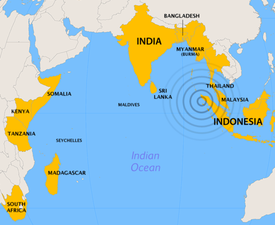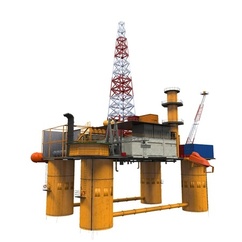
I remember staying on top of that news more than I do most news because it was a story of human tragedy and also one of human unity, where countries across the globe acted quickly to address the tragedy as best they could. There were so many acts of kindness on the scale that we'd love to see happening all the time, but that thank heavens we at least see in times of great need.
There were stories of animals heading to safety before the tsunami struck while most people remained woefully unaware of the impending doom. And videos we see online today show people wading along the shoreline when the tsunami hits and no doubt sweeps them from this world.
As I dug into the story, I also came across those you might call "less credible." Conspiracy theories about the earthquake that caused the tsunami. Some say that the earthquake was caused by nuclear testing in the ocean; others suggest the use of modern weaponry involving electro-magnetic pulses, even intentionally causing the quake to wipe out populations that were largely considered the enemy. A search today shows the U.S. and/or India as the culprits in this story, but I remember at that time reading about Russia's involvement, using an advanced technology that may have been involved in other world events as well.
I'm not one to ignore a theory just because it isn't mainstream, nor to fall for the tactic of burying a story by labeling it a conspiracy. (Theme from Darwood and Smitty.) I'm also not one to think that we, the public, know about all the technologies being used. But I also feel that legitimate questioning (it should always be legitimate to ask questions) shouldn't lead to illegitimate assumptions. I'm not sure how much evidence anyone ever came up with on this tsunami conspiracy. I only remember conjecture.
On the plus side, the tsunami not only led to mass relief efforts and showcased the best side of humanity. It also had a number of its own miracle stories. People unscathed because of their own unique circumstances when in the regions struck. I happened to meet one couple, while still in Brazil, who had been on a diving trip during the event. They happened to offshore and underwater when the waves hit in Phuket. They did remember some strong currents while diving, but didn't think much of it until their boat brought them back to the destruction of the island later.
Of course since the tsunami, a warning system has been put in place to try making sure we don't see another tragedy on that scale. But it seems to me that, as we go about our daily lives, we should remember that there are large-scale tragedies happening every day in our world -- tragedies that need just as many donations and/or efforts and compassion to address. For instance, thousands of people around the world die each day just because they lack access to clean water and sanitation. That's more than one million people per year -- similar to 4 or 5 of the 2004 tsunamis every year.
So we should remember the 2004 tsunami not only because of the horrific images it left us, but because it reminds us of the job we have while we're here. It reminds us that we must gather together and address the tragedies striking others when we're in a position to help. Food and water -- the most essential elements of life -- seem like a useful place to start. But maybe, too, we each need to find what we're called to, and then go out and make a difference. There is opportunity here for every one of us.

 RSS Feed
RSS Feed